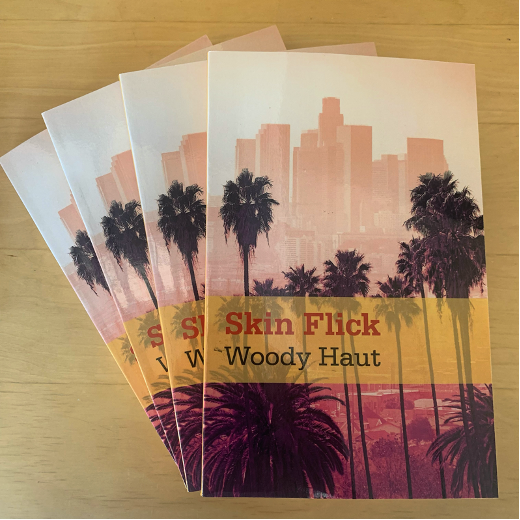We all have friends from the past, especially when we were teenagers. In most cases, it is essential to leave the past to be a memory, be very much into the present, and hopefully, think about the future. That doesn’t happen in Woody Haut’s noir novel Skin Flick. “Friends,” in the sense that they had no chance to be without the others when you’re in high school age become involved in a beating and murder of what may have been a homeless man in Pasadena, California, sometime in the 1960s. Two made the killing, one did a bit of kicking the body, and the other two witnessed the crime committed by their friends.
A murder of a woman took place, and it is possible that this fellow they found hiding behind a trash can was the murderer, or perhaps a poor fellow looking for food in the trash. Nevertheless, as the reader, we can’t trust the narrative. Billy, the main character and not a hero by any means, has severe guilt feelings about the death, but the other three seemed to work it out in their system as being part of a youth thing, but these things happen, and we move on. The ability to move on is very much the presence in Haut’s tense psychological thriller.
For Billy, re-entering the world of his past, finding a daughter of a sort-of girlfriend from his youth becomes the unraveling of his being, as he is thrust into a world, he should have left way behind. Fate plays its hand in such a manner as in a classic David Goodis narration. Woody Haut is a noir historian and knows American crime novels like the placement of his imagination. He understands the psychological tinges of being unbalanced in a topsy-turvy world and one of horrendous trauma.
Billy’s fall from a safe point, which has always been a tight landscape for him, is when he witnesses a killing by his friends. How that affects one or a grouping, and how does one live after that? The most damaged of the four involved is a homeless friend with destructive sexual obsessions who somehow married Billy’s love interest for a while. The other broken soul, of course, is Billy. At the novel's start, you see him as a troubled fellow due to what he feels is his part in the murder, but then slowly, like a leaky coffee cup, little drips come out. For instance, Billy is a journalist and had to “fabricate” an interview for a newspaper, which I would think is a total no-no in journalism. As he gets more sucked into the story, the more he becomes unhinged. Haut is such a skillful writer that he gradually changes the story's tone masterfully.
Skin Flick covers the Pasadena of the 80s before it became an outside shopping mall. Haut’s use of the location is a mere reflection of the psychology as well as being at the heart of the Reagan years. As hard as one pulls one image down, it is sometimes replaced by another. The question, in all crime fiction, is essential, but the journey is what tells the tale, and Skin Flick stings in the right way.




Jonathan Ames was great but he booked it out of there before I could fight the crowd from the front to the back where he was stationed...